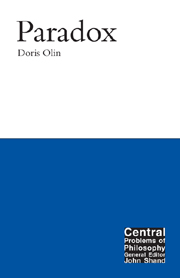Book contents
1 - The nature of paradox
Summary
Paradoxes can be fun. They can also be instructive, for the unravelling of a paradox may lead to increased philosophical knowledge and understanding. The paradoxes studied in this work offer promise of both these features. But paradoxes may be also disturbing; their study may reveal inadequacies, confusion or incoherence in some of our most deeply entrenched principles and beliefs. The reader is forewarned: some of the material that follows may prove unsettling.
It seems wise to begin at the beginning, with the questions “What is a paradox?” and “How does one resolve a paradox?” But first we need some examples of paradoxes at our disposal.
The Monty Hall paradox
You are invited to be a contestant on a fabulous game show. The host of the show, Monty Hall, explains how the game works. After some initial banter and scintillating chat, you will be presented with three doors, A, B and C. Behind one of the doors will be the car of your dreams - a Porsche, a Jaguar, whatever you wish. Behind each of the other two doors is a worthless goat. Which door conceals the car is decided randomly. You will first be asked to pick a door; then Monty, who knows what is behind each door, will pick, from one of the other two doors, a door that has a goat behind it, open that door, and show you the goat.
At that point, you will be offered a second option.
- Type
- Chapter
- Information
- Paradox , pp. 1 - 20Publisher: Acumen PublishingPrint publication year: 2002



